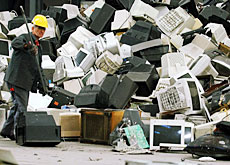
Switzerland calls on companies to clean up their act

Environment ministers and experts are gathering in Geneva this week to discuss ways of strengthening private industry’s commitment to dealing with hazardous waste.
Switzerland wants companies to take greater responsibility for the mess caused by their activities.
“One of the major issues we’re promoting is the inclusion of businesses in the responsible disposal of all sorts of objects and substances, ranging from computers to chemical pollutants,” said Beat Nobs, head of the Swiss delegation to the meeting.
“We also want to see greater synergy between multinationals, environmental protection agencies and United Nations bodies,” Nobs told swissinfo.
The government’s priorities are in line with the theme of the Seventh Conference of Parties to the Basel Convention, which begins on Monday, and aims to promote public-private partnerships as a means of dealing more effectively with the global waste challenge.
The Basel Convention was originally adopted in 1989 to prevent rich countries from dumping hazardous waste on their poorer neighbours.
According to Nobs, this so-called “toxic trading” has been largely brought under control since the Convention came into force in 1992.
But he warns that many issues still need to be dealt with, such as the dismantling of shipping tankers in places like India, Bangladesh and China.
Ship-breaking
“Big container ships are brought to shore and cut up for parts by workers who don’t know they’re often handling dangerous materials such as asbestos,” said Nobs.
“So we need to work with shipping lines and UN agencies, like the International Maritime Organisation, to promote the sustainable recycling of sea vessels.”
This is a position that is fully supported by the environmental lobby group, Greenpeace, which will be an observer at the meeting. It says the practice of “ship-breaking” will be one of its top priorities during the five-day talks.
“This is about liability and accountability,” said Wangpo Tethong, spokesman for Greenpeace Switzerland.
“The chemical industry must be held accountable for what they are doing and we hope that governments will come up with a legal framework that prohibits companies from behaving in this way,” he told swissinfo.
Electronic waste
Nobs cites the success of a Swiss initiative – to convince the telecom industry to recycle old phones – as proof that electronics companies can and should share the burden of safe product disposal.
The deal, which was announced in 2002, was the first of its kind and has since given thousands of unwanted mobiles a new lease of life in the developing world.
But Nobs says the transport and disposal of “e-waste” is increasingly becoming a problem for industrialised and developing nations alike, with millions of tons of obsolete electronic goods and appliances piling up worldwide.
“Hazardous waste is a problem for everyone,” said Nobs. “We’re all suffering from exposure to [potentially toxic] chemicals like arsenic, lead, mercury, nickel and zinc.”
In China, the number of televisions, washing machines, refrigerators, air-conditioners and computers in use neared 900 million in 2003. Of those, about 28 million were estimated to have reached retirement age.
Meanwhile, a study commissioned by the Swiss environment agency showed that around 82,000 tons of electrical and electronic waste were generated each year in Switzerland alone.
Monitoring mechanism
Switzerland also boasts a highly developed “return” system for electronic goods, called Swico, which requires manufacturers to take back their products.
Under the scheme, consumers pay a recycling fee in advance when they buy an item. When it reaches the end of its life, they can take it back to any retailer free of charge.
But Tethong points out that there is “no systematic monitoring mechanism” in place to ensure that subcontractors do not purchase the goods and pass the problem on to poorer countries.
“We have no real knowledge of what happens to this e-waste,” said the Greenpeace spokesman. “The companies may take it back but there is no control over where it goes after that.”
Both the Swiss delegation and Greenpeace hope that this week’s conference will result in more multilateral cooperation between industry and the public sector to prevent such abuses.
swissinfo, Anna Nelson in Geneva
The Seventh Conference of Parties to the Basel Convention on the transport of hazardous waste is taking place in Geneva this week.
The Convention is one of a trio of treaties which aim to protect human health and the environment.
The others are the Rotterdam Convention on chemical substances and the Stockholm Convention on Persistent Organic Pollutants.

In compliance with the JTI standards
More: SWI swissinfo.ch certified by the Journalism Trust Initiative

























You can find an overview of ongoing debates with our journalists here . Please join us!
If you want to start a conversation about a topic raised in this article or want to report factual errors, email us at english@swissinfo.ch.